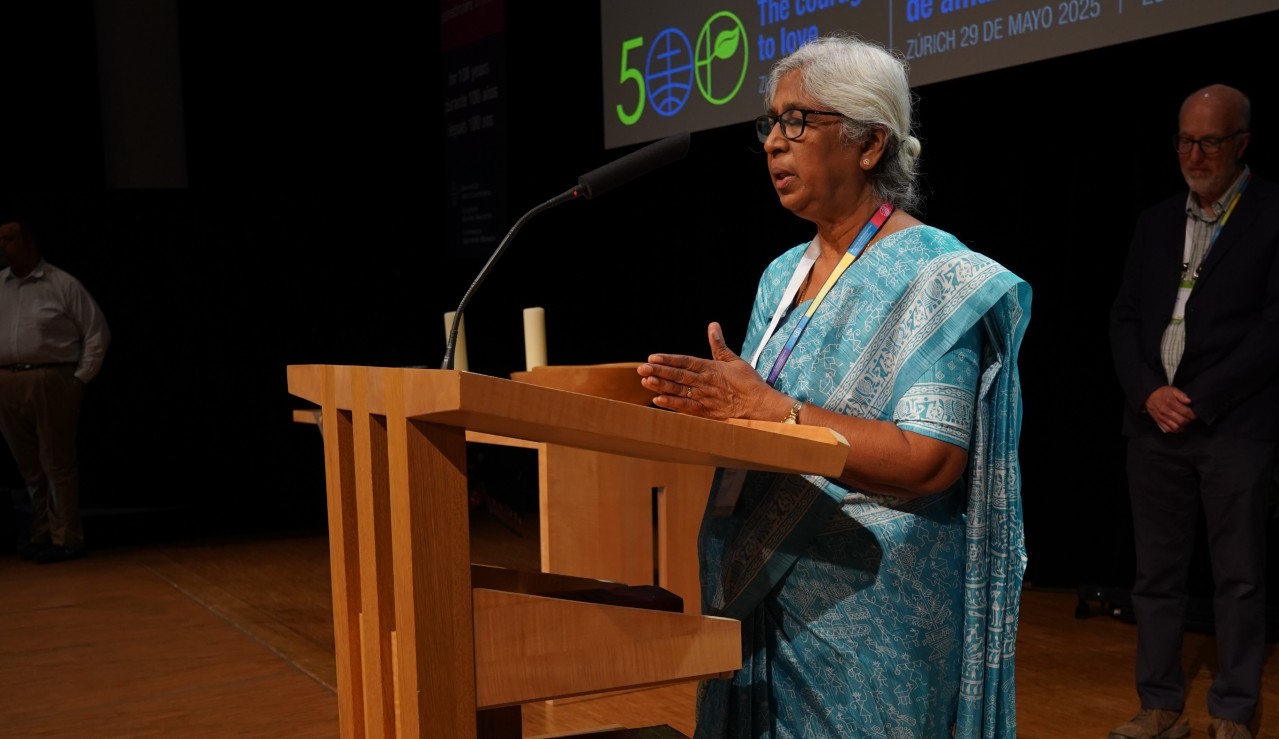Cynthia Peacock served Mennonite World Conference as regional representative to South Asia 2014–2025. She was also chair of the Deacons Commission from 2009–2015. At the General Council meetings in Germany in May 2025, Timo Doetsch (General Council delegate for Arbeitsgemeinschaft Mennonitischer Brüdergemeinden in Deutschland – AMBD) asked her to share her experience.
Following Jesus as an Indian woman
I was not even 20 when I joined Mennonite Central Committee as a receptionist, and it was there that I came to know what it means to be a true Christian, a disciple.
Later on, I came to know what and who were the Mennonites and Anabaptists and I realized that I really was hungry to know more.
Then I began to read up materials. My MCC representatives sent me to workshops and then I became connected with Indian Anabaptist churches, and so as I began to know more about what it means to be a Mennonite.
Jesus became more real to me in my daily living and I wanted to be a disciple in its full sense, even though I was quite young.
Over time, I was given the responsibility to work with women. Then I became a single mother of two small kids, raising them with a lot of struggles. Meanwhile I continued to work with women’s groups and became in charge of the Education Department, which sponsored children education. I also got to know their families and struggles.
Through it all, Jesus became more and more real to me.
And so I became a Mennonite in my heart.
I always felt that I have to introduce Jesus to people who are suffering and are following false gods and are without hope. So I would look for opportunities where they would ask me questions and then I would share.
That way my faith was getting stronger while I was working in different positions and finally I came into leadership position in MCC and then I retired.
Mennonite World Conference work
I never ever imagined that I would be called by MWC because it’s a global network and I was in a local church in India. We started a house church in my own house – very small, two rooms. An opportunity came and now it’s become a full-fledged church with first- and second-generation Christians.
But when the call (to serve MWC) came then I said yes, I must join and do whatever my experience has taught me.
MWC invited me to serve first in the task force of the Global Anabaptist Service Network (GASN), to form it for one year.
Then they invited me to be the chair of the Deacons Commission. I served for six years in that position. There again, I was interacting with the global church and discovered the varying needs of churches around the world, and understanding their struggles.
I thought we are a small minority community [in India] and we have all the struggles. But no, in different ways, other countries are suffering too because of their faith. So that was an eye opener for me.
After that I was asked if I could serve as a Regional Rep(resentative). That helped me to become closer to our national churches.
Since representing MWC, I felt that church leaders’ perspective of me changed. At first, it took a while for them to accept me because I was younger and a woman. But gradually that changed and now I can say all the leaders accept me well and gave me their respect.
I retired with a contentment and I give all credit and gratitude to God, but to MWC after that.
Living out unity in India
By virtue of being an MCC staff, and later as an MWC regional representative, I was interacting with all eight conferences of the Indian Anabaptist churches through workshops and conferences.
The churches had very little idea about development in those times. They would do church work only within the four walls: preach and teach only for Christians.
That’s where I was getting involved with them to help them understand that the churches’ role is also to go beyond the four walls. And not only preaching, but also meeting their social needs, their spiritual needs, their mental needs, those kind of needs.
But when I was appointed into the Deacons Commission, I took upon myself that I have to teach my brothers and sisters about Anabaptism. I talked to the leaders and I said let’s sit together, have a library and also do some teaching. And so they allowed me to do that because of MWC.
Building peace
Conflict teaches me something new to be able to relate with all types of people. My experience working with the people in the villages, with the Hindus: they have taught me much. They have so many struggles: Food needs, so many fights at home because of economic problems, but still they live together peacefully. How do they do that? Those are some things that I have learned and I have been able to share that with my Christian brothers and sisters.
There are so many challenges to promote peace or to exemplify that you believe in peace. First is to build up a relationship with your neighbors from other kinds of backgrounds, and then to respect who they are for whatever religious groups they come from.
When we just preach, they are not willing to swallow what we feed them. We have to also first be open to receiving; relationship is one way of demonstrating what I understand to be gospel of peace. And then when they ask what it means for me, my faith, what it means to me a peace builder, then I share about Jesus as a peacebuilder, peace giver, as the Prince of peace.
It’s a learning process.
Throughout my life I learn. So much more to learn, to understand.
